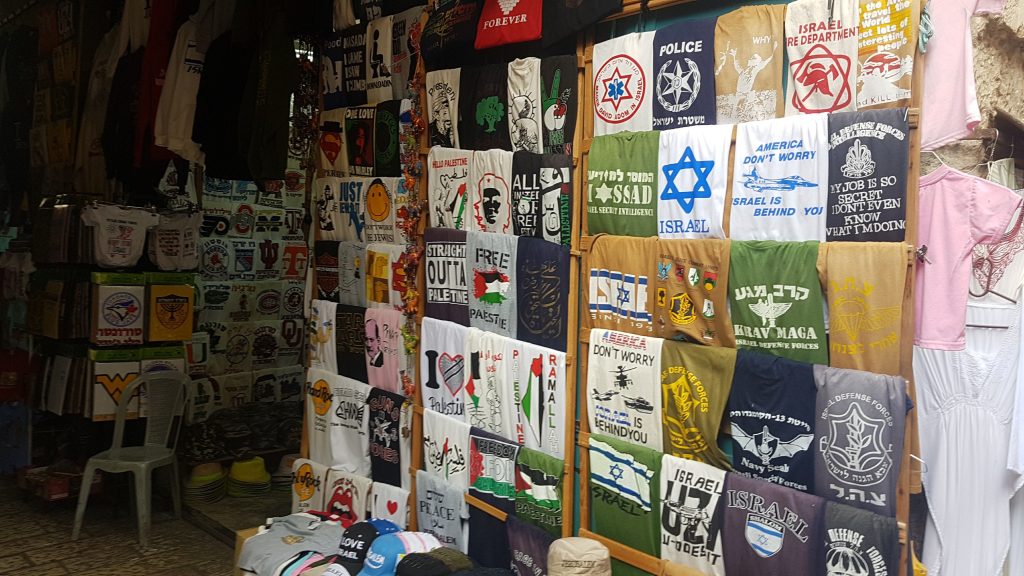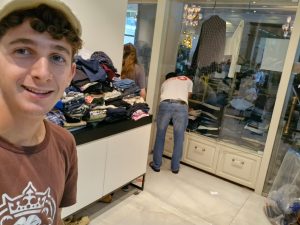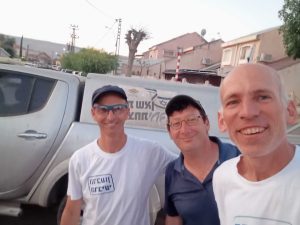I have always liked walking through the markets of the old city of Jerusalem, ever since I was little it has fascinated me. Walking down the middle of the market, past many entrances of shops covered with merchandise hanging from above and on all sides, it is impossible to tell when one shop ends and the next begins. In front of every shop stall sits a merchant that tries his best to catch your attention, and with some luck and some skill to bring you past the entrance and into his store, there in his world of glitter and sparkle … he has the chance to get you to open your wallet and purchase a souvenir.
The merchandise changes from store to store. Some sell food, produce, sweets or spices. Others are in the antique business – from old houseware to ancient coins and pottery. Many carry touristy souvenirs, from the classic shot glass or magnets to the more traditional and specific religious items. Such as Rosary Beads, Olive Wood Nativity Sets and various bejeweled crosses for the members of the Christian faith. Prayer mats, artwork with the Dome of the Rock or the Al Aqsa mosque for members of the Muslim faith, and Mezuzahot, Talitot- Prayer shawls, and other Judaica items for the Jews. Jewelry and various attire and fashion items are also popular, of the local style as well as international styles and brands.
Fashion, in the sense of what you wear and how you wear it, can tell a lot about who you are, whether you like it or not. This is a big topic that much has been spoken and written about. I would like to talk about one little piece of cloth that is a key component of everyday attire for many around the world, the T-Shirt. These stretchy, light and inexpensive pieces of clothing are exactly what many of us need when we just want to throw something on. And yet, this statement doesn’t do justice to the T-Shirt.
Ever since printing in various methods on T-Shirts started (Screen Printing/ Heat Transfer Vinyl, Digital printing technology and others), T-Shirts have become a canvas for almost every realm of our social environment. T-Shirts are printed for self-expression, advertisements, protests and souvenirs. They are used to commemorate events or to make a political or personal statement. They are used by companies with corporate logos or messages as part of their overall advertising campaigns. It is branding, in every manner, in an inexpensive way via fast fashion, different designs, fabrics and styles.
I know this all too well. Over the years I have accumulated many T-Shirts. Some from stores, others from youth group activities. Many are from my army service. In the army many units issue T-shirts to mark accomplishments such as finishing training or courses. Groups and missions I have guided have also provided T-Shirts, or as we call it today – Swag. I have picked up T-Shirts from sites I have visited around the world, and of course T-shirts of favorite music bands and sports teams.
So it should not come as a surprise when I tell you that many of the shops and merchants in the old city of Jerusalem offer those passing through a variety of T-shirts. What catches my attention is not the tourist style t-shirts, those reflecting a visit to Israel or Jerusalem, but two other phenomena.
The first, American college and university logos and sports teams, and American sport teams in general- NBA, MLB, NFL and NHL. These T-Shirts are unique because they offer college, university and team names in Hebrew. It is different and unique and automatically identifies that they came from Israel. I am sure that wearing them back home beyond creating a conversation brings pride to their owner for their school and team and to Israel. Today with Israel’s place in the international world these t-shirts can create good vibes, as I am also aware of the unfortunate hostility one can receive by wearing them.
The second phenomenon is the variety of topics one can find on T-Shirts in the market. Yes there are many T-shirts about Israel, and many provide fun and humorous takes on its’ sites, people and culture. But that is just the beginning. T-Shirts of the Israeli army, the Israel Defense Forces (IDF) and its various branches and units are popular. T-Shirts, commenting on the Israel – US relationship such as ‘America don’t worry Israel’s got your back/ is behind you’ are everywhere to be seen. A wide variety of humorous Jewish T-Shirts are to be found such as ‘Guns and Moses’, ‘Jew-Jitsu’, ‘PikaJew’, ‘Winnie the Jew’, ‘Don’t worry be Jewish’, ‘SuperJew’ and many others. Lately many T-shirts with reference to social media have popped up like ‘I don’t need Google my wife knows it all’, ‘Fuck Google ask me” and others. There is even an influx of T-Shirts using foul language which some would say are disrespectful in this ‘Holy City’.
Not superseding, yet very much still catching the attention of people are the many and diverse T-shirts with references to Palestine. Not surprisingly, because this is the region, and many of the Arab, Christian and Muslim citizens of Israel and residents of Jerusalem identify themselves as Palestinians. Also not surprising, in spite of the official dispute between the State of Israel and the Palestinian territory, because Israel is a democratic state with many freedoms. One of those freedoms being freedom of speech. The writing on these T-Shirts are in English and in Arabic and the images are often recognizable symbols such as peace signs, Palestine flag colors, portraits of leaders (such as Yasser Arafat), Keffiyah (Traditional male headdress), Olive trees, Handala, images inspired by pro-Palestine street artist Banksy and many others.
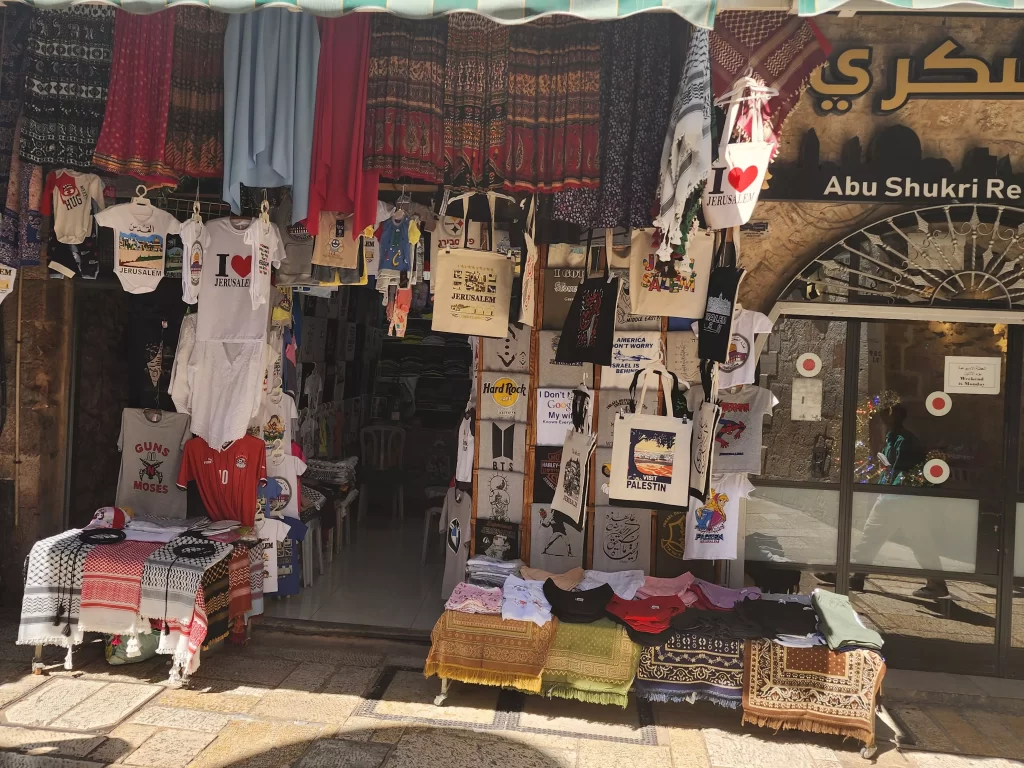
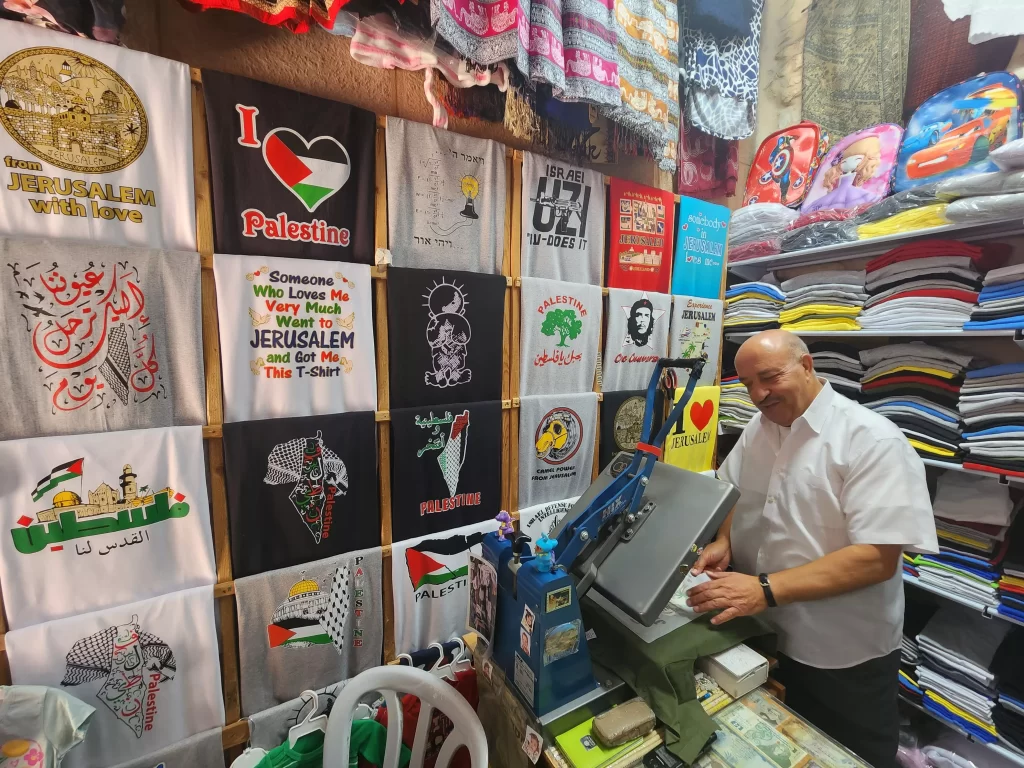
One thing I can say about these T-Shirts is that you can find them everywhere in the old city regardless of the area or quarter or the background or identity of the store owner. Yet they are most prominent in the markets between all the other merchandise. One place in particular is interesting. It is a small shop on El Wad Street, just across from the fitness station of the Vie Dolores. It is in the Muslim quarter, in the heart of the tourist and pilgrimage route, (see miracle mile) and on the route from Damascus gate all the way down to the Western Wall Plaza. This shop displays all these types of T-Shirts alongside each other. This might not sound odd, until you realize the reality of having a Free Palestine T-Shirt hanging next to and IDF or IAF T-Shirt on the one side, and a ‘America don’t worry Israel’s got your back’ T-Shirt on the other side, and right above a SuperJew shirt. I don’t know of any other place in the world, nevertheless the Middle East, where this can take place. This is not the only store, yet its juxtaposition is the most intriguing.
This is not limited just to T-Shirts. In the market everyone is selling everything. Jewish, Muslim and Christian vendors are offering items regardless of the tradition, religion or nationality they represent. One would say this is obvious, we are living in a capitalist world, free trade, and everyone wants to make a dollar and bring home an honest earning to pay the bills. But for me, here in Jerusalem, this is much more. Even though below the surface there is much tension in this city between the diverse populations, and even though one could claim that there is a very limited co-existence (we have separate neighborhoods, separate schools and youth-movements, separate media outlets, we speak different languages, etc…), in the market there is a shared-existence where ordinary people, regardless of their background, go to work every day, and will sell everything and anything to everyone and anyone to pay the bills. And if you don’t believe me, I suggest you venture out through the markets of the old city of Jerusalem and see it for yourselves, it is all written on a T-Shirt.
